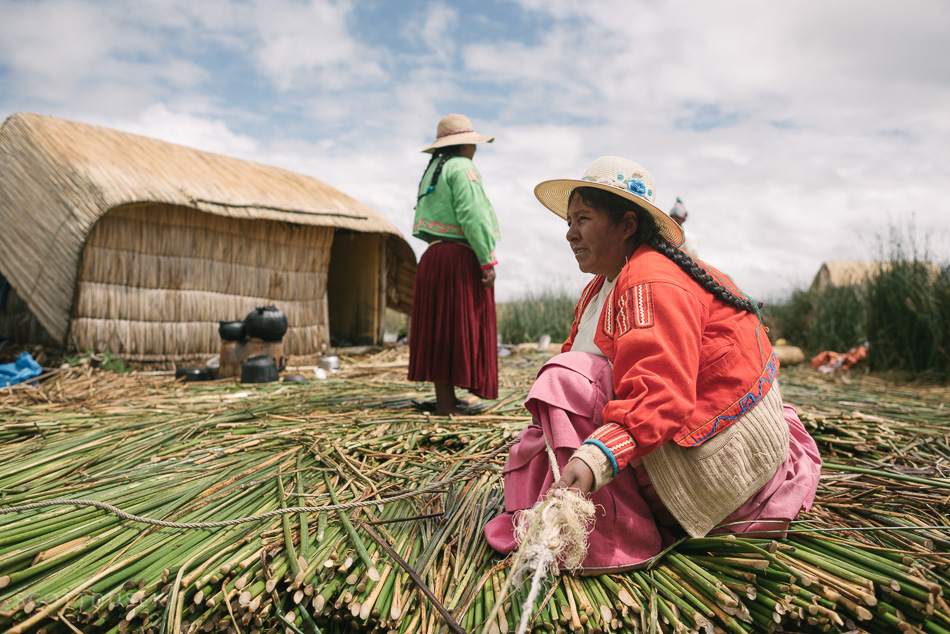Homestays are always an interesting experience. It can be awkward, it can be transcendent, and it sometimes dizzily sways between the two.
My parents, Dan and Terri, had recently joined us in Peru. We spent a comfortable week in and around Cusco, Peru’s frenetic and beautiful tourist city. We had eaten international food, shopped, had massages, and explored South America’s star attraction – Machu Picchu.
It was time to switch up the experience a bit. An eight hour bus took us the small city of Puno on the banks of Lake Titicaca. Aside from a small pedestrian corridor, the city belongs to the locals. The population is largely indigenous Aymara or Quechua speaking people. Most of life in Puno doesn’t revolve around tourism. It was a nice change. We mimicked the Peruvian families around us and ate rotisserie chicken while marveling at the enthusiastic soap bubble fights that took place nightly in the plaza.
We hadn’t come here for Puno, the world’s highest navigable lake was the draw. My mother is not a boat person so naturally we chose to take a 3-day boat trip and homestay on the lake. Sorry mom; when in Rome…
Our first stop on the lake was to the Urus Islands. The islands are man-made and built from local reeds. Why only make an island from a reed? You can eat them too.
As we sailed further into the lake we began to realize how big it is. The weather was also turning for the worse. It is a big enough body of water that when the winds came up the waves became substantial. Our boat captain had apparently never experienced this before. Depending on who you ask to recount the 3-hour boat journey to Amantani island you will get everything from harrowing to hilarious. My dad and I spent most of the ride on the roof laughing and howling into the wind. Val literally slept the entire way. My mother and the locals… endured.
The ~20 people we disembarked with were relieved to be on dry land. On Isla Amantani we were greeted by a local indigenous families. They split the visitors off into groups of four people. Each group was assigned a host family and led off to settle in. We watched and sometimes helped cook, ate meals with them, and observed life. Val and I took the chance to break away from my folks and let them go with a different host family. Sometimes a language barrier can open up other forms of communication – I hoped.
It sort of worked out. The other two people in their group were a French chef and his prized pony of a wife. The French couple was quite underwhelmed by pretty much every aspect of their host families lives, and they weren’t quiet about it. Their behavior verged on overtly disrespectful until they simply disengaged and stopped eating the food or participated. Good times!
My parents don’t speak French, nor spanish, nor Aymara. They did a lot(!) of smiling and nodding. Meanwhile. Valerie and I were with two vivacious Chilean guys – Cristian and Christian. We immediately joined “Equipo Cristian” (Team Christian). I change my name and took on a double-h to form Chhristian and Val would became Christiana. We had no trouble communicating with our new friends or amazing host family and from start to finish we had a ton of fun.
On our second night on the island the experience culminated in a village dance. Our hosts dressed us up in local clothing and herded uw into a dance hall. An awesome party ensued with local music and a whole lot of dancing. Was this an authentic experience? Who cares! It was a hell of a lot of fun and we had a great time.
Our return journey was much less eventful. My folks, despite difficult odds, had pushed through and connected with their host family and had a good time. We laughed and recounted the stark differences in our experience. The views had been spectacular, our host families were amazing, the food had been fresh from the earth and deliciously simple, and no one was struck with seasickness. Success!
















































What do you think? Leave me a comment.